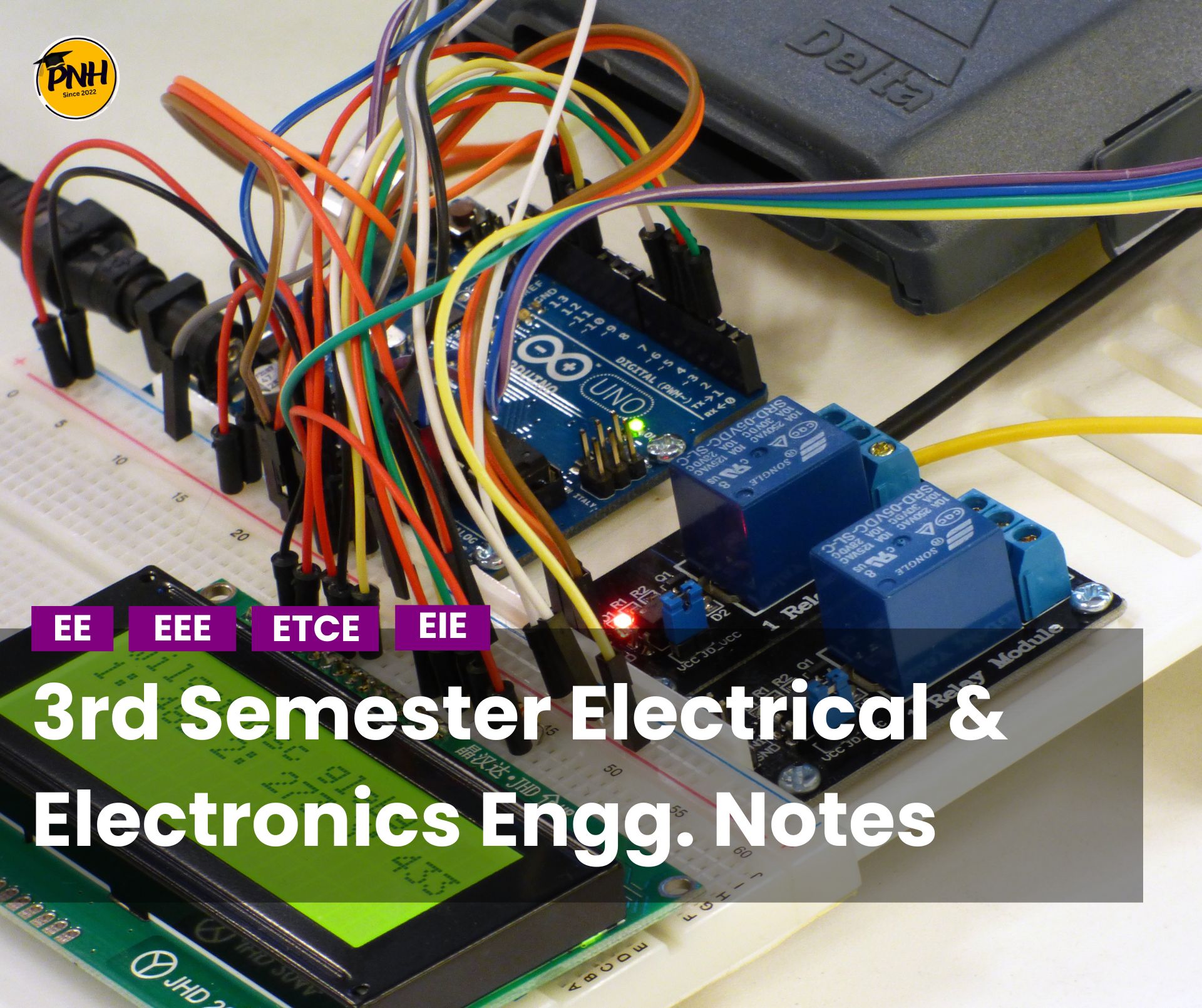In this blog, we will know about 3rd Semester Electrical and Electronics Engineering Notes. Welcome to Poly Notes Hub, a leading destination for engineering notes for diploma and degree engineering students.
Author Name: Abhishek Karki
3rd Semester Electrical and Electronics Engineering Notes
Engineering students, particularly those studying Electrical and Electronics Engineering (EEE), understand how vital the third semester is. This period of study provides the foundation for advanced courses in electrical machines, circuit analysis, and electronics. This guide will provide you with thorough information about the courses covered, as well as learning strategies and resources for 3rd Semester Electrical and Electronics Engineering Notes that will help you in your academic journey.

Core Subjects Included in the Third Semester EEE Curriculum
The following are the primary subjects typically covered in the third semester syllabus for Electrical and Electronics Engineering:
- Electric Circuit Analysis
This subject covers the fundamentals of electrical circuits, circuit laws, network theorems, and analysis techniques. Students learn how to tackle difficult circuit problems and conduct AC and DC circuit analysis. - Electrical Machinery – I A fundamental course that includes transformers, DC machines, and synchronous machines. This topic lays the groundwork for the understanding of electromechanical energy conversion.
- Electronic Devices and Circuits Students are introduced to semiconductor devices like diodes, BJTs, and FETs. The design and analysis of electronic circuits are the focal points of this discipline.
- Electromagnetic fields This course focuses on vector calculus, electrostatics, magnetostatics, and Maxwell’s equations. The principles are critical for comprehending sophisticated electrical machinery and communication networks.
- Digital Electronics A critical topic that includes number systems, logic gates, Boolean algebra, and combinational and sequential circuits. These fundamentals are essential for classes such as Microprocessors and Embedded Systems in later semesters.
- Engineering Mathematics – III This subject covers complex analysis, probability theory, random processes, and numerical methods, all of which are required to solve technical problems in engineering.
- Environmental Science and Engineering This subject focuses on environmental issues, pollution control, waste management, and sustainable development principles that are critical for responsible engineering practices.
Download Notes PDF of EEE Engineering – Easy Access Study Material
Students studying Electrical & Electronics Engineering can substantially benefit from well-structured and organized study resources, especially when they are provided in a simple PDF format. The Download Notes PDF of the EEE Engineering collection has everything a student needs for effective study, from extensive chapter-by-chapter notes to lab guides, solved numerical problems, and essential theoretical questions typically asked in exams.
These services not only save students time, but also help them to concentrate on their studies without having to go through many textbooks or dubious web sources. Every concept is well presented, which helps to lay a solid basis for more challenging subjects in subsequent semesters.
Poly Notes Hub meticulously curates and updates these PDF notes on a regular basis to reflect the most recent university and AICTE-approved syllabus. Whether you require concise explanations, step-by-step solved examples, derivations, or previous years’ question papers, all of the materials are provided in a single, easy-to-download package. This guarantees that students are always ready for regular class examinations, midterm exams, and final semester evaluations.

How to Effectively Use Electrical and Electronics Engineering 3rd Semester Notes
To make the most of these notes, students should follow a few key strategies:
- Start with Fundamentals: Always start with the fundamentals, such as circuit laws and simple theorems, before progressing to more difficult problems.
- Solve Numerical problems: Practical disciplines such as Electric Circuit Analysis and Electrical Machines necessitate problem-solving experience. Use the notes to complete the end-of-chapter exercises.
- Refer to diagram-based explanations: Visual learning using circuit diagrams helps memory recall in areas such as Digital Electronics and Electronic Devices.
- Take advantage of summaries and key points: The notes feature summary sections following each topic, which is perfect for short reviews before tests.
- Attempt Previous Year’s Questions: Most notes include solved prior question papers to assist you learn the test pattern and key subjects.
Advantages of Using 3rd Semester Electrical and Electronics Engineering Notes
Here are some advantages of using high-quality, well-structured notes.
- Concise notes provide a student-friendly manner for covering the material, saving time compared to hefty textbooks.
- Exam preparation notes cover frequently asked questions and crucial subjects.
- The notes simplify complex concepts and provide clear explanations.
- Notes are portable and accessible in PDF format, allowing students to view them anytime on mobile devices.
- Lab manuals include practical experiments from the third semester curriculum.

EEE Notes PDF – A Must – Have Resource for Every Electrical and Electronics Student
Every aspiring electrical engineer needs a dependable EEE Notes PDF collection to help them with their academic preparation. These meticulously collected PDFs provide chapter-by-chapter coverage of all essential disciplines, ensuring that students understand both theoretical principles and their practical applications with ease. Whether it’s circuit analysis, electromagnetic field theory, or electronic gadgets, the notes break down complicated concepts into simple explanations.
The notes follow an organized framework that contains comprehensive derivations, formula lists, solved numerical problems, and explanatory pictures. This allows pupils to practice self-study without having to constantly resort to different books or online courses. Each PDF is meant to be consistent with university syllabi and examination schedules, allowing students to select the most important topics.
Why Third Semester is Crucial in Electrical and Electronics Engineering
The third semester marks the beginning of key engineering disciplines. The knowledge learned here serves as a foundation for understanding advanced subjects like as Power Electronics, Control Systems, and Microprocessors in subsequent semesters. Circuit design, machine operation, and electromagnetic theory are all crucial concepts for future research, industrial positions, and competitive tests such as GATE.
Tips for Scoring High Using Electrical and Electronics Engineering 3rd Semester Notes
- Allocate dedicated study hours to review each subject with notes.
- Using the same notes, discuss concepts with peers to clarify and improve understanding.
- To prepare for tests, review summaries, key derivations, and math problems on a regular basis.
- To improve performance in practical exams, practice laboratory experiments using lab manuals from notes.
- Consult Professors for Difficult Topics: Notes can cover 80-90% of the curriculum, but some areas may still require faculty assistance.
Conclusion
The availability of well-prepared 3rd Semester Electrical and Electronics Engineering Notes has a major impact on engineering students’ academic performance. These notes cover everything from theoretical principles to practical lab guides, making complicated topics easy to learn and exam-ready. Poly Notes Hub provides students with extensive, structured, and syllabus-oriented study material for the third semester, allowing them to stay ahead of their homework and achieve good scores.
By combining these notes with self-study and practical learning, students can lay a solid basis for the forthcoming semesters and their future jobs in Electrical and Electronics Engineering.

